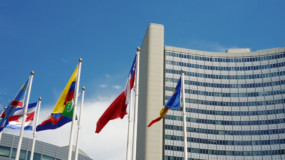Posted on 20 Sep 2017
ENACT, a new project funded under the Pan-African Programme, was launched today in New York at the 72nd UN General Assembly, with a high-level event featuring the AU Commissioner for Social Affairs, H.E. Amira El-Fadil, former Nigerian President and Chair of the West African Commission on Drugs, Olusegun Obasanjo, and Dr. Mohamed Ibn Chambas, Special Representative of the Secretary-General and Head of the UN Office for West Africa and the Sahel (UNOWA).
The meeting brought together more than one hundred representatives of African and European governments, regional bodies such as the International Conference on the Great Lakes, the G5 Sahel and the International Parliamentary Secretary of the Mediterranean.
ENACT, which stands for “Enhancing Africa’s Capacity to Respond Effectively to Transnational Organized Crime”, is a consortium lead by the pan-African NGO, the Institute for Security Studies, with INTERPOL and the Global Initiative against Transnational Organized Crime. It is a key instrument in the EU-AU African Partnership, working on an issue that is increasingly seen as a cross-cutting threat to Africa’s ability to achieve stability, good governance and sustainable development.
The project has created 5 regional organized crime observatories, which are building up the body of evidence on transnational threats by publishing a series of research and policy tools. The project will launch in 2018 a vulnerability assessment tool that will analyse the threats and responses of all the countries in the African Union. These analytical tools are intended to catalyse a more active and strategic response to the challenges of organised crime on the continent, and to support prioritization of key threats. The project also supports a range of network and capacity building activities in a range of sectors, including state institutions and the police, but also civil society actors, journalists, academia and the private sector.
Despite speaking from different backgrounds and experience, the three keynote speakers spoke with a striking degree of coherence about the challenges the continent faces, and the globalized nature of the flows.
H.E. Commissioner El-Fadil, spoke with passion and concern about the extent to which Africa’s achievement of the Sustainable Development Goals (SDGs) are at risk from organized crime. Criminal groups and actors, often enabled by corruption, are pillaging Africa’s resources, and in doing so they are robbing the continent of livelihoods, exacerbating instability and degrading the environment. She spoke with concern about how human trafficking and smuggling groups are perverting the aspirations of Africa’s youth.
H.E. Obasanjo highlighted three inter-related dangers that West African nations face from drug trafficking: firstly that drug-funded corruption undermines state institutions, governance and the rule of law; secondly that drug traffickers are building alliances with other criminal and violent elements in society and the region, and finally that there is an increasing and dangerous impact on the health and social cohesion on local communities. He observed that while “so far, West Africa has escaped the bloody carnage experienced by Central America on a daily basis, but with the stakes so high, there is no room for complacency”.
Both Dr. Chambas and the EU representative who opened the event on behalf of the European Union, Special Representative to the Sahel, Ambassador Angel Fernandez Losado, spoke to the extraordinary obstacle organised crime and illicit flows present in a fragile state or conflict resolution context. When seeking to build consensus and ownership around transition and building peace, illicit flows serve as an opposing force. They encourage and resource actors of violence and create incentives to disengage in central state consolidation, and our strategic and programmatic responses do not sufficiently account for this phenomenon.
In the subsequent active debate amongst the participants, the senior representatives spoke supportively of the role that the ENACT project could play in improving the evidence basis and capacity of African actors themselves to investigate and analyse organised crime, and they welcomed the convening and bridging role that the project could play between European and African states, as well as with civil society. A number of speakers noted the importance of the pan-African approach of the project. Illicit flows do not constrain themselves to one region because it is convenient for policymakers: human smugglers have broken down borders between West Africa, the Sahel and North Africa; drug traffickers move heroin with impunity along the East African coast from Somalia to South Africa.
Through this well attended and interesting event, the ENACT project has showcased its potential to build a strong collaboration between Europe and Africa in responding to transnational organised crime.



